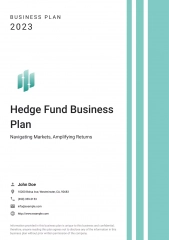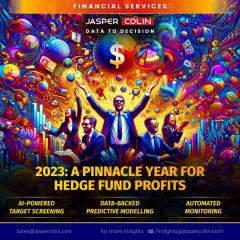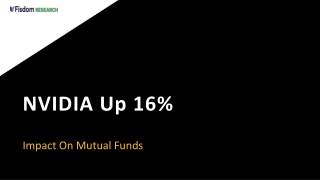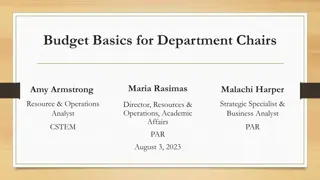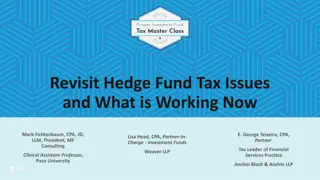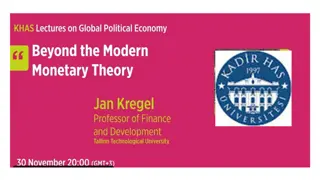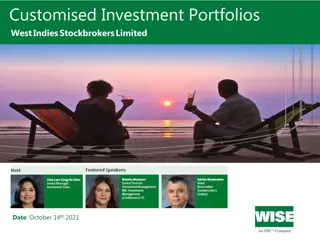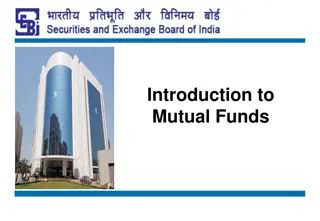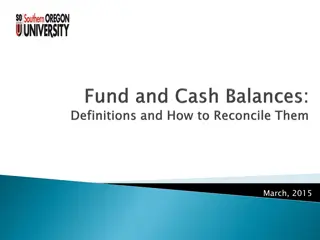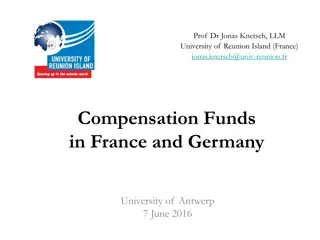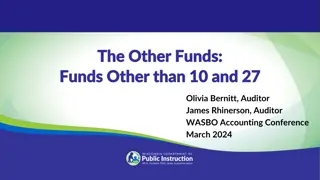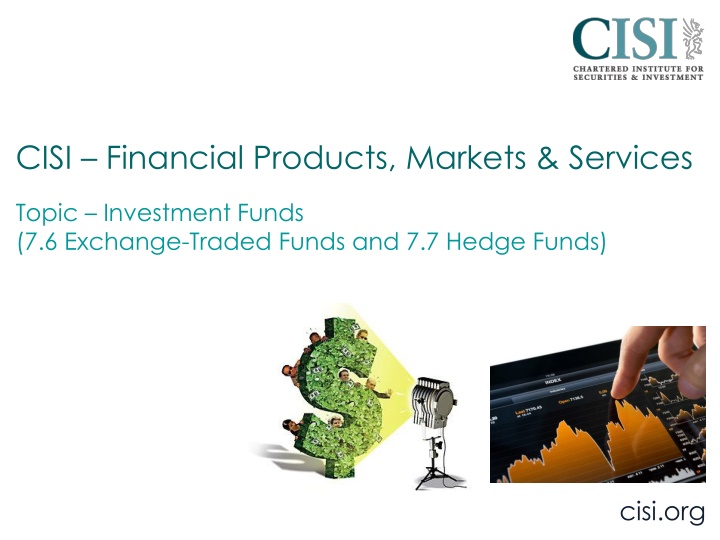
Exchange-Traded Funds: A Comprehensive Overview
Learn about Exchange-Traded Funds (ETFs) - how they work, their pricing dynamics, advantages, and trading mechanisms. Discover why ETFs are gaining popularity among investors as flexible investment options tracking various financial assets.
Download Presentation

Please find below an Image/Link to download the presentation.
The content on the website is provided AS IS for your information and personal use only. It may not be sold, licensed, or shared on other websites without obtaining consent from the author. If you encounter any issues during the download, it is possible that the publisher has removed the file from their server.
You are allowed to download the files provided on this website for personal or commercial use, subject to the condition that they are used lawfully. All files are the property of their respective owners.
The content on the website is provided AS IS for your information and personal use only. It may not be sold, licensed, or shared on other websites without obtaining consent from the author.
E N D
Presentation Transcript
CISI Financial Products, Markets & Services Topic Investment Funds (7.6 Exchange-Traded Funds and 7.7 Hedge Funds) cisi.org
What is an Exchange-Traded Fund? They are similar to tracker funds, in that they mirror a particular index such as the FTSE 100 in the UK or S&P 500 in the USA. Baskets of shares or other tradable assets e.g. Invests in shares of all FTSE 100 companies Set-up as a company Quoted on a stock exchange Open-ended Exchange-Traded Fund (ETF) Buy shares in an ETF through a stock exchange via stockbrokers. Pays dividends to shareholders. Shareholders can also make a capital gain (or loss) by selling their shares. The London Stock Exchange has a special subset of the Exchange for ETFs, called extraMARK Investors cisi.org
ETF Pricing A unit trust (or mutual fund) will always be priced at the NAV per unit, based on the day s closing prices. But an ETF is priced according to market demand. ETF shares may trade at a premium or discount to the underlying investments, but the difference is minimal and the ETF share price essentially reflects the value of the investments in the fund. We have come across the term Net Asset Value (NAV) before. Key definition: Net asset value per share: the closing market value of all securities owned plus all other assets such as cash, subtracting all liabilities, then dividing the result (total net assets) by the total number of shares / units in issue. cisi.org
ETF Pricing ETF shares may trade at a premium or discount to the underlying investments, but the difference is minimal and the ETF share price essentially reflects the value of the investments in the fund. DB Agriculture Fund Discount / Premium to NAV If the underlying assets of an ETF are in hot demand, the price can rise to a small premium to its underlying NAV. Example: an agriculture-based ETF when a major grain exporting country is experiencing drought Similarly, if the underlying assets go suddenly out of favour, the price of an ETF can dip below the NAV. Example: bonds when there has been an unexpected interest rate increase cisi.org
Trading ETFs Because ETFs are traded like ordinary shares, they provide much greater flexibility when it comes to buying and selling. ETFs are listed on the stock exchange and bought through stockbrokers While unit trusts are priced once a day, shares in ETFs are traded on the stock exchange, so the prices move throughout the day. ETFs are open-ended Investors do not have the problem of shares trading at big discounts or premiums to NAV (which often occurs with closed-end funds, such an investment trusts) cisi.org
Advantages of ETFs One of ETFs key strengths is that they bring a wide range of investments within reach that might otherwise be difficult to access efficiently. ETFs can track any traded financial asset: ETFs are now available for commodities and corporate bonds. Investors can even buy funds that track more esoteric sectors, such as infrastructure or water. ETFs charges are less expensive than many open-ended funds: ETFs do not levy front-end charges, early redemption penalties or exit charges. Stockbrokers exhibit the following charges: A very small difference (0.1 or 0.2%) spread between the buy and sell prices at which investors can purchase or dispose of shares. An annual management charge is deducted from the fund (typically 0.5% or less). Commission paid when shares are bought or sold No stamp duty paid on purchases cisi.org
Introducing Hedge Funds Why are they called hedge funds? The purpose of a hedge is to mark a boundary, or to form a barrier against something. Farmers plant and lay hedges to mark the boundaries of their fields and to prevent livestock from entering or escaping. From that original concept derives the expression to hedge against something, meaning to guard against the risk of loss. In their original form, hedge funds sought to eliminate or reduce market risk cisi.org
Hedge Fund Investment Strategies There are many different styles of hedge fund some risk-averse, and some employing highly risky strategies. There are few restrictions as to what they do with their investors money to provide them with a return Type of Strategy Employed Details Reduce market risk by going both long and short on the same or similar financial assets, or by using derivatives to lay off some of the investment risk To go long means buying a security To go short means selling a security that the investor does not at that time actually own, in the hope of buying them back more cheaply if (as the investors expects),the market subsequently falls. Most hedge funds aim to achieve absolute return Attempt to profit regardless of the general movements of the market, by carefully selecting a combination of asset classes, including derivatives, and by holding both long positions and short positions Some hedge funds place a greater emphasis on producing highly geared returns than on controlling market risk Borrow funds and use derivatives to potentially enhance their returns. cisi.org
Accessing hedge funds Most hedge funds are established as unauthorised collective investment schemes. Therefore, they are unregulated. Unauthorised investment schemes cannot be marketed to private individuals because they are considered too risky for the less financially sophisticated investor. Many hedge funds have high minimum investment levels. Access is therefore restricted to wealthy investors and institutions (pension funds and insurance companies) LOTS OF MONEY LOTS OF MONEY Most hedge funds require minimum investments in excess of 50,000; some exceed 1 million Being unauthorised means they can invest in whatever assets they wish. They usually impose lock-in periods that prevent the investors cashing in on their investments for a minimum of say, three months. However, investors can also gain access to hedge funds through funds of hedge funds which can involve lower minimum investment levels cisi.org
Managing transactions and Fees Most hedge funds appoint a prime broker to handle their transactions. A prime broker is usually an investment bank. The prime broker is who the hedge fund will buy and sell investments from, borrow from and, often, entrust the safekeeping of their assets to. Hedge funds charge their investors performance-related fees, in addition to the usual management fees charged by most growth funds. Performance fees can be substantial, with 20% of the performance above certain levels (often termed net new highs or the high water mark ) being common. cisi.org
Comparing collective investment schemes Authorised Unit Trusts Trust OEICs Investment Trust/REITs Company Exchange- Traded Funds Company Legal Structure Company Board of Directors Board of Directors UK Listing Authority Closed Authorised Manager Trustee Authorised Corporate Director Depository Management Company Depository Management Supervision Regulation FCA FCA FCA and UK Listing Authority Open Open or Closed-ended Pricing Open Open Dependent on demand and supply Stock Market Based on net asset value Single or Dual-priced Single or Dual-priced Authorised Manager Authorised Manager Authorised Corporate Director Authorised Corporate Director Stock Market Trading Settlement CREST CREST cisi.org

